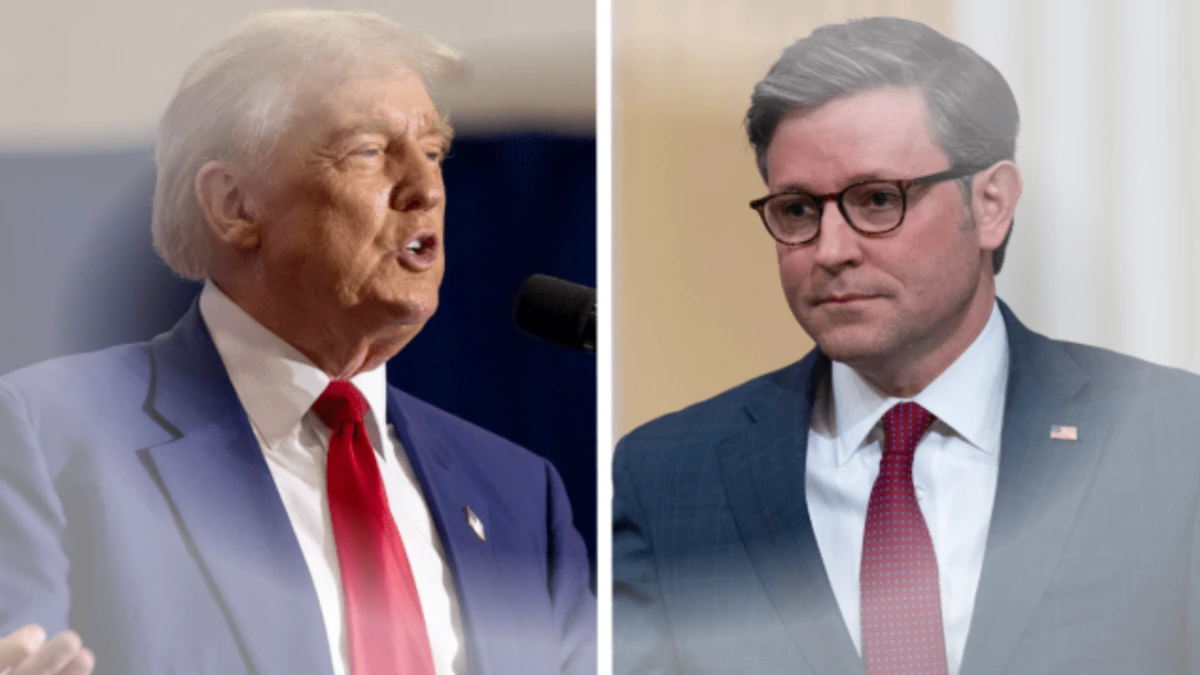WASHINGTON — House Speaker Mike Johnson on Sunday defended his characterization of the weekend’s “No Kings” protests against former President Donald Trump as “hate America” rallies, insisting his comments were directed at the tone of the demonstrations rather than at Democrats as a whole.
“I’ve never called anybody an enemy,” Johnson said in an interview on ABC News’ This Week. “But there were a lot of hateful messages during Saturday’s protests.”
The remarks came after millions across the country joined peaceful rallies denouncing Trump’s return to political prominence and what organizers called “a growing threat to democracy.”
The “No Kings” protests, held in major US cities including Washington, New York, Los Angeles, and Chicago, were organized by a coalition of progressive groups advocating against what they view as Trump’s authoritarian tendencies.
Demonstrators carried signs reading “Democracy, Not Dynasty” and “No Kings in America.” Johnson, a staunch Trump ally and key Republican leader in Congress, earlier described the protests as gatherings of “anarchists, Antifa advocates, and the pro Hamas wing of the Democratic Party,” drawing criticism from Democrats and some moderate Republicans.
During his Sunday appearance, ABC’s Jonathan Karl pressed Johnson about the remarks, noting his previous statements following the murder of conservative activist Charlie Kirk in which Johnson had urged Americans to see one another as “fellow countrymen.”
Johnson responded that his latest comments were not directed at Democrats in general but at “violent rhetoric” displayed during the rallies. “We have video and photos of pretty violent rhetoric calling out the president, saying ‘fascists must die’ and all the rest,” he said. “So it’s not about the people, it’s about the message.”
Political analysts said Johnson’s comments reflect the increasingly polarized tone of American politics in the run up to the 2026 midterms.
“Johnson is walking a fine line,” said Dr. Emily Carter, a political scientist at Georgetown University. “He wants to energize the conservative base by echoing Trump’s rhetoric, but at the same time he’s trying to maintain a speaker’s image of unity and civility. That tension is visible in how he defends his language.”
Dr. Robert Kim, a communications expert at the Brookings Institution, noted that framing opposition protests as “anti American” has long been a tactic used by political figures to delegitimize dissent.
“It’s a rhetorical strategy designed to shift the focus from the protesters’ message to their perceived motives,” Kim said. “It’s not new, but it’s effective in hardening partisan divides.”
According to data compiled by the American Civil Liberties Union, over 400 demonstrations were recorded nationwide on Saturday under the “No Kings” banner. More than 2.3 million people participated, marking one of the largest coordinated protest events since the Women’s March of 2017.
In contrast, counterprotests organized by conservative groups drew several thousand attendees in cities such as Dallas, Atlanta, and Phoenix.
Surveys conducted by the Pew Research Center earlier this month show that 62% of Americans believe political divisions are deeper now than at any time since the Vietnam War, while 45% say they worry democracy “may not survive another decade of polarization.”
In New York City, protesters filled Times Square carrying American flags and chanting, “Liberty belongs to the people.”
“We’re here because we believe democracy is fragile,” said Sofia Ramirez, a 27 year old teacher from Queens. “No one is above the law, not even a former president. That’s not hate that’s patriotism.”
But some attendees acknowledged that anger was palpable in parts of the crowd. “You could feel the frustration,” said Malcolm Jones, a veteran from Pennsylvania. “People are tired of feeling ignored, but it’s easy for that passion to cross a line.”
Outside the Capitol, a smaller group of Trump supporters gathered in a counterprotest, waving banners reading “Faith, Family, Freedom.” One attendee, 52 year old construction worker Daniel Reeves, said he agreed with Johnson’s assessment. “They say it’s about democracy, but what I see is a lot of people tearing America down,” he said. “That’s not protest, that’s hate.”
Political observers predict that such confrontations are likely to intensify as the 2026 election season approaches. Johnson’s framing of the protests could become a rallying point for Republicans seeking to unify behind Trump amid internal divisions within the party.
“The speaker’s remarks are not accidental,” said Dr. Carter. “They’re part of a broader messaging campaign to portray Trump’s critics as fundamentally opposed to American values.”
Meanwhile, Democratic leaders have called for restraint on both sides. “We can disagree without demeaning our democracy,” said House Minority Leader Hakeem Jeffries in a statement Sunday evening. “Americans protesting are exercising the very freedoms our Constitution protects.”
As political tensions flare across the nation, Speaker Mike Johnson’s comments have underscored the deepening ideological rift between America’s two dominant parties.
While Johnson maintains that his “hate America” label was aimed at rhetoric, not people, his words have reignited a broader debate over how leaders frame dissent and what it means to love or criticize one’s country.
Whether the “No Kings” protests will mark a fleeting moment of resistance or a turning point in public discourse remains uncertain. For now, they stand as a reminder that America’s struggle over identity, democracy, and free expression is far from over.
